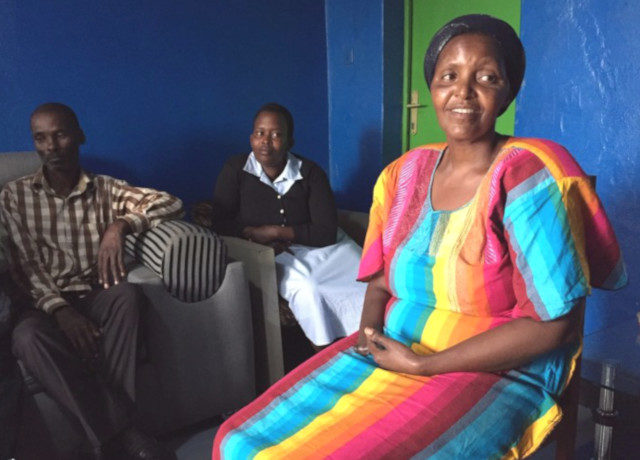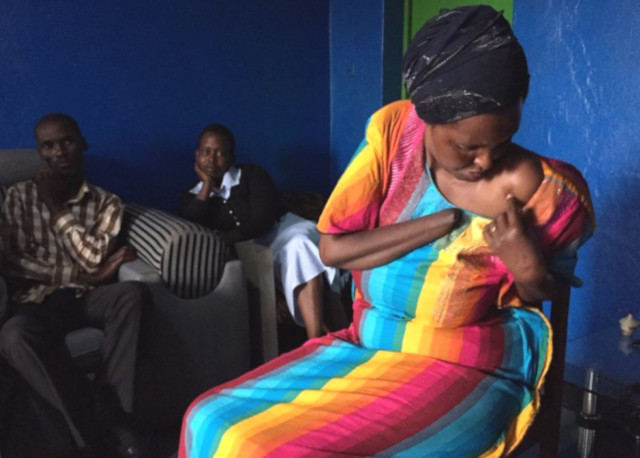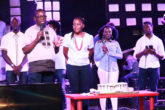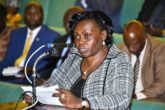
Alice Mukarurinda (R) shares her personal experiences as a Tutsi during the Rwandan genocide of 1994 with a group of reporters on Feb. 18, 2019, at her home in the village of Nyamata, Rwanda. To her left is World Vision staffer Goreth Mbabazi. To Mbabazi’s left is Emmanuel Ndayisaba, the man who cut off Mukarurinda’s hand. | WORLD VISION / BRIAN DUSS
She had her hand chopped off, her head bludgeoned and saw her 9-month-old daughter split in two, but 25 years later, 48-year-old Alice Mukarurinda and the man responsible for cutting off her limb, Emmanuel Ndayisaba, are now good friends.
According to the Christian Post, the two have preached the need for forgiveness and reconciliation that has encompassed Rwanda in the last quarter-century since one of the worst human rights atrocities in world history took place — the genocide against the Tutsi.
In April 1994, Alice and her husband were among the hundreds of thousands of Tutsis left to die after being beaten, hacked, speared, burned, smashed or shot to death by mobs of angry citizens and security forces driven by an extremist ideology pushed by officials in Rwanda’s Hutu-led government.
The goal was to “exterminate” their social class. Many were killed by their neighbors and friends they thought they could trust.
In the span of three months beginning in April 1994, it is estimated that as many as 1 million were killed in the 90 percent Christian country with many of them massacred inside churches.
Most were Tutsis and others were moderate Hutus who refused to participate in the extermination of Tutsi “cockroaches” that the government at the time considered to be fake Rwandans.
Fortunately for Alice and her husband, they survived despite the physical harm they suffered. However, their baby daughter, her mother, her siblings and many of their neighbors were not as fortunate.
“Every day in that month, they were killing, killing, killing,” Alice said through a translator while speaking with reporters on a press trip to the country with the evangelical human rights NGO World Vision U.S., which has provided relief and development efforts throughout most of the country since 1994.
“[Many people] were coming with different weapons and they were just killing. By that time, there were many people who were involved in the killing — the soldiers and even the airplanes were around us checking where we are so that they could kill us all. We thought that is the end for us and that we would no longer survive.”
Alice tried to seek refuge and tried to hide in the water. At the time, Alice’s family and other local Tutsis couldn’t eat or sleep because they were constantly on the move trying to hide. Many died from hunger and horrible conditions.

On April 29 of that year, Alice’s family finally met their fate.
There were so many people that came with weapons given to them by the French government and they all came. There were machetes, there were axes, arrows … and bullets,” she said.
Alice was struck in the head with some kind of blunt force weapon that had a nail sticking out and she was speared in the shoulder. She also lost her hand in the process thanks to a chop from Emmanuel. Meanwhile, a group of men cut her child in two. Her husband was also attacked but he had less serious injuries.
“It has been much worse. It’s been a long time and that is why it doesn’t look as bad,” she explained as she showed the journalists her scars. “At that point [you are in another state of mind] so you don’t know who is doing what.”
The perpetrators believed that Alice was dead and dumped her unconscious body along with the mangled remains of deceased victims. Many of the bodies were ravaged by hungry dogs.
The few people that remained alive in the pile of death, the Rwandan Patriotic Front (the rebel group that ultimately took power and ended the genocide in July 4, 1994 when it overtook the capital of Kigali) rescued them and took them to receive medical help.
“They didn’t know some people were still alive, so [I] was taken sometime after others were taken,” Alice explained. “They couldn’t tell who was alive or dead. Their bodies were filled with [maggots].”
Although Alice was born into a family with 11 siblings, just her and another sibling survived but are left with disabilities from the genocide.
She said that all the doctors had been killed so it was hard to get treated but they did the best they could. Alice had no mobility or movement on half of her body because of the damage. It took her two months to learn how to move again and for her brain to function the way it used to.
She was taken to an IDP camp where she was reunited with her husband.
If I don’t forgive, I won’t inherit the kingdom of God
Having been saved at the age of 15, Alice knew that one of the key principles of her faith is forgiveness. When she returned home, she read the Bible. She read about forgiveness and how God is merciful to “those who didn’t deserve it.”
She said that she feared that if she didn’t forgive like God forgave her of her sins, then she would not inherit the kingdom of God when her time comes.
Alice recited the words of Matthew 3 in the native Bantu language of Kinyarwanda.
“You are blessed when you are at the end of your rope. When there is less of you, there is more of God and His rule. You are blessed when you feel you have lost what is most dear to you,” she quoted through the translator.
“The Bible talks about poverty as not those who don’t have [things] to wear, [things] to eat, and [things] to drink but those who cannot forgive,” she added.
Today, Alice is 48 and has five children that she says God blessed her with. But she has also come to terms with what happened and is part of a local association of 30 genocide victims and perpetrators that have asked for forgiveness that have worked to construct 180 homes to replace ones destroyed by the violence. The association constructed 30 other houses that are complete except for the fact that they are waiting for roofing.
Following the genocide, Alice said she prayed for God to present the man who carried out the crimes against her and her family. God obliged. But when the time came and one of the attackers who chopped off her arm came to her house to ask for forgiveness, she fainted.
Why? Because Alice had already developed a relationship with that same man, Emmanuel, working through the local reconciliation organization Ukuri Kuganze (Let the Truth Reveal) but she didn’t know the whole time that it was he that cut off her hand and that it was his colleagues that murdered her daughter.
“[I] couldn’t believe that this was the person that [I] was working with in so many areas. It just all got black,” Alice recalled. “I fainted and they took me to the hospital.”
Her husband was upset to find out that she was working to rebuild homes with the same man who carried out such a horrific act against their family.
“It was difficult for [my husband] to understand that in our midst was someone that killed their baby,” she said. “Because we were saved and because we knew God, we made that decision within that week to forgive him because it is what we were called to do. Before that, I hadn’t spoken to him and I didn’t know what to say to him. My husband kept reminding me that God was with us everywhere we went and that is what made us forgive him.”
“I went back to the place where we were building, the house they were constructing was one that World Vision had supported the construction,” she added. “I found him at the top of the structure and I asked him to come down and told him that I forgive him. It was all fine in my heart. I felt [the feeling] of healing and peace.”
She encouraged Emmanuel to go to her other family members and ask for their forgiveness.
“My family had forgiven him except the small children,” she said. “[They] asked him many questions now they also have forgiven him.”
Alice said that it helped that her family had already decided to forgive the perpetrators before even knowing who committed the crimes.
“Because of our Christian faith, we started the process of forgiving before we knew who did it,” she said. “I see the Hutu as one. I put them all together. I started off by forgiving all the Hutu.”
According to Alice, there is no longer blood on Emmanuel’s hands.
“We all forgive him and we live together peacefully,” she said. “He visits me. I visit him. No problems.”
Emmanuel was let out of prison in 2003 after the government mass-released many genocide perpetrators and innocent Hutus rounded up and jailed by authorities without trial after the rise to power of the RPF. The RPF still controls the country under the leadership of popular President Paul Kagame, who took office in 2000.
The perpetrators were let out of jail so that they could help rebuild the torn nation. The release allowed many of them to be tried in local “Gacaca” courts where community members could accuse perpetrators who them saw carry out the crimes.
As the secretary of her local Gacaca court, Alice was still inclined to report Emmanuel to have him tried for his crimes against her family. However, she pleaded with other members of the community court to have leniency on Emmanuel. She also asked other court members to forgive Emmanuel. Instead of going to prison, Emmanuel was ordered to do public works to help rebuild society.
“If it were not for the Gacaca court, Emmanuel would still be in prison,” Alice said. “The Gacaca [sped] up the process. He was involved in the work that they were giving people who asked for forgiveness. Instead of taking them back to jail, they could do public works like constructing the roads, supporting [the victims].”
‘I came to realize that I had done wrong’
Emmanuel, 47, told the reporters outside of Alice’s home in Nyamata that it was his own faith in Christ that inspired him to ask for forgiveness.
“I knew what I had done, so I took time because I was also a Christian, I took time to think about what I had done and I came to realize that I had done wrong so I said that I have to go and ask for forgiveness,” Emmanuel, an Adventist, said through a translator.
“I asked for forgiveness from the bottom of my heart. Committing the sin is easy. Asking for forgiveness is always hard. But for me, I had taken that step and I have been forgiven. I really [appreciate] the people who have forgiven me.”
Emmanuel said that he initially thought that he killed Alice. He knew who she was because they studied in school together.
Imprisoned in 1997, Emmanuel reflected on his need to repent and seek forgiveness.
In 2003, he was released from jail. That is when he found out Alice was still alive. Along with Alice and her family, Emmanuel said that he asked five families in total for forgiveness. There were some other families he wanted to ask for forgiveness but they are no longer living in Rwanda.
Emmanuel said he feared what it would be like to go to the victims and ask for their forgiveness but he was able to overcome that fear.
Today, Alice and Emmanuel are friends and on occasion visit each other’s houses. Additionally, their kids enjoy spending time with each other.
“We want people to know that although there was genocide in Rwanda, the people have come to reconcile and unite together,” Emmanuel said. “[We] want to share with other people so they can also [take the initiative] to ask for forgiveness.”
As a symbol of forgiveness, Emmanuel and Alice have planted trees on each other’s properties. On Alice’s property, Emmanuel planted a lemon tree.
“This tree is a fruit tree and it will bear fruit so Alice and her family can come and get fruit from here,” Emmanuel said. “This recognizes that [I] asked for forgiveness and it is a symbol so they will never forget [me].”
Alice said that Emmanuel was not the only one who came to her and asked for forgiveness. Although the pain still exists in Alice’s heart, she knew that healing starts with forgiveness.
According to Alice, there is no more Hutu-Tutsi division.
“I want people to know that as of today, there are no Hutus or Tutsis here. We are all united and reconciled. I want people to know that … we are all Rwandans. Above all of it, there is God. If you don’t believe in God, then it will be difficult for you to forgive or to ask for forgiveness. Today, [I am] not supposed to be alive. But God kept [me] alive and kept [me] here so that [I] can tell the story to others and know that it would change their heart.”
World Vision International, an evangelical charity, led a development program in Nyamata that came to an end in 2017. During that time, Alice was a major participant in those efforts.
World Vision has maintained a presence in Rwanda for the past 25 years since the start of the genocide. While other humanitarian agencies also responded to the humanitarian crisis, World Vision is one of the few international NGOs that have remained in the country. In fact, it is the largest humanitarian organization working in Rwanda.
With over 300 staff in Rwanda, the organization is active in 24 out of the 30 districts in the country and has supported over 1.2 million people, including two of Alice’s children. This support was done through more than two dozen area development programs including the one in Nyamata.
“I really appreciate the work of World Vision,” Alice said.
Part of World Vision’s focus in the years immediately following the genocide was to work with other organizations, the government and numerous churches to foster reconciliation between the two groups. Additionally, the government and the people of Rwanda made it their responsibility to start over and create a new Rwanda. Today, World Vision’s focus has shifted to improving the health, education and livelihood of people in Rwanda.
Rwanda, a small landlocked nation of 12 million people, has become a shining example of how a country infested with hatred and division during a “time of death” can transform into a united country living peacefully in just 25 years.
As the 25th anniversary of the Rwandan genocide is just over a month away, it represents a time of celebration for the reconciliation that has occurred, according to World Vision Rwanda Program Director Ananias Sentozi.
“Generally, we don’t feel that [division] anymore,” he said. “That doesn’t mean that there are not people who still have that anger, that bitterness. They are still digesting the wounds, the losses they inherited in the genocide against Tutsi. But that is at the individual levels. But as a nation, there is nowhere you can trace any sense of division in Rwanda.”
Reporting by The Christian Post.

